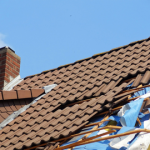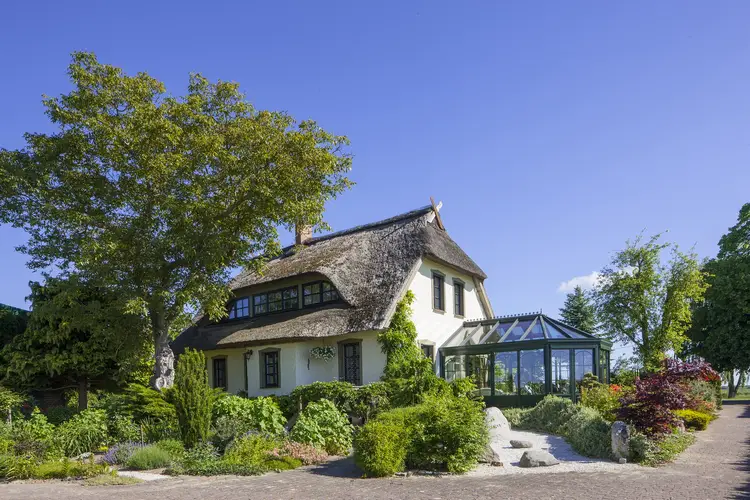
During your property search you’ve found the perfect little grade 2 listed thatch cottage. But you’re now worried about whether you can get a mortgage and if the insurance will be more expensive. This is why it’s important to know should you buy a house with a thatched roof.
It’s okay to buy a house with a thatched roof if you understand that a thatched roof house needs more maintenance than a house with a standard tile or slate roof. A thatched roof needs replacing every 30 to 40 years, which is expensive and it costs more to insure a house with a thatched roof.
When you’ve finished reading about buying a house with a thatched roof, you should read the full list of pros and cons of a thatched roof too.

Is buying a thatched property a good idea?
Buying a thatched property is a good idea if you like the thought of living in a beautiful quaint cottage. Thatched roofs are a good idea, as they provide excellent insulation. But many thatched roof properties have small windows and the rooms can be very dark.

How long does a thatched roof last?
Most thatch roofs will last between 30 and 40 years, which is when the thatch will need replacing. However, the thatch will last longer if it is regularly maintained by a professional thatcher. But the roof ridge on a thatch will need to be replaced every eight to ten years.
If this ridge is not replaced regularly the thatch may begin to leak when it rains (see below).
What are the problems with thatched roofs?
The problems with thatched roofs include the following:
- There can be a build-up of moss and algae making it look unsightly, making it more difficult to sell*.
- Discolouration and rotting of the thatch.
- Leaking in heavy downpours (see below).
- Wind damage that can accelerate rotting and cause the thatch to leak.
- Greater fire risk (see below).
- Vermin or bird damage (see below).
* The build up of moss and algae is more noticeable on the north facing side of the roof. This is because it gets the least amount of sun and will remain damp for longer after it rains.

Can you get a mortgage on a thatched cottage?
You can get a mortgage on a house with a thatched roof, but they are more difficult to arrange. This is because houses with thatched roofs are deemed “non-standard” construction. Properties with non-standard construction have fewer mortgage lenders willing to offer mortgages.
This may mean the interest rate you pay on a mortgage arranged on a thatched property is slightly higher than on a standard construction roof.
Are thatched houses more expensive to insure?
A thatched roof house is a greater fire risk so expect to pay up to three-times more for buildings and contents insurance. Insurance on houses with thatched roofs is also more expensive because the rebuild cost is higher than conventional construction houses, as they are built using specialist materials.
Also, most thatched roof properties are listed buildings. Listed buildings on their own are also more expensive to insure. This is for the reason they are often built using specialist materials and may require builders with specialist skills and knowledge. This results in a higher rebuild cost, which as a consequence increases the cost of insuring the property.
Are thatched cottages warm?
The thick layer of natural straw or reed on a thatched roof house provides excellent insulation. This means that a house with a thatched roof will be warm in the winter and will help keep fuel bills to a minimum. But a thatched cottage will also be cool in the summer too.
Do thatched roofs leak?
If you’re thinking about buying a house with a thatched roof, it’s important to understand that in very heavy rain storms a thatched roof can leak water. But on the whole a thatched roof is great at keeping water out. However, this is only if the thatch is in a good state of repair.
Which is no different to any other roof in a poor state of repair, which can also leak water. A leaking roof that’s badly maintained will not be covered by insurance.
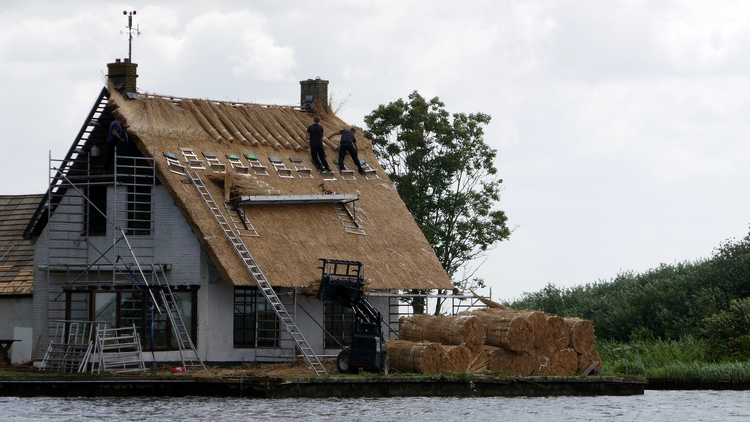
Are thatched roofs hard to maintain?
Thatched roofs are harder and more expensive to maintain, as they require a specialist thatcher to maintain the roof. But with proper maintenance a thatched roof will last longer. The length it will last will also depend on the materials used and the clement weather.
If the weather is rainy and damp for prolonged periods this will affect how long a thatched roof will last. But more bad weather may require more maintenance, which will be more costly too.
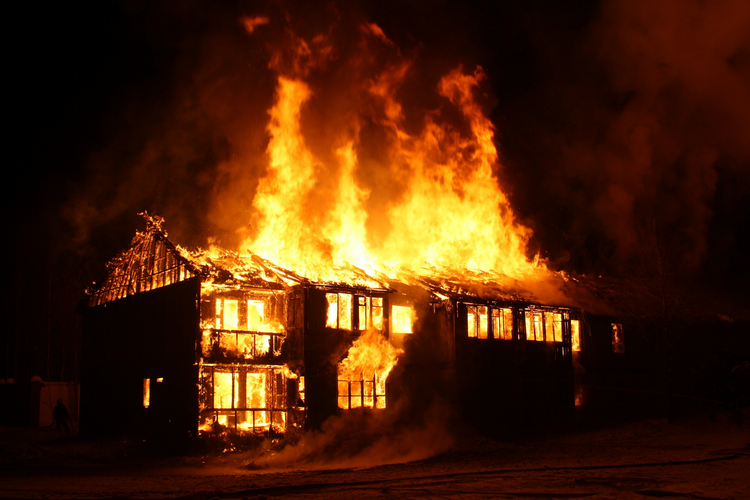
Do thatched roofs catch fire?
Thatched roofs are a much greater fire risk as a result of the material they are made from. This fire risk comes from lightning strikes, stray sparks from chimneys, electrical faults inside the house and sparks from garden bonfires. Once a fire has taken hold in a thatched roof it spreads very fast.
However, some argue that a fire is no more likely to start in a thatched property that in a regular tiled or slate property. But whether or not this is true, it’s because of the materials used to thatch a roof that means a fire will spread more quickly. It also means more damage will be done to the house in a shorter space of time.
Do thatched roofs attract vermin?
A thatched roof can attract vermin. This includes rats, squirrels and mice. Birds can also cause damage to thatched roofs when they steel the thatch to build their nests.
But this risk is minimised if the wire netting covering the thatch is well maintained. The wire mesh covering makes it more difficult for vermin and birds to attack the thatch material.
Having said that, if rats are able to get under the netting, they can cause havoc. Rats can make a real mess of the thatch and will burrow holes under the thatched roof.
Is a house with a thatched roof a good house for a first time buyer?
It’s not a good idea for first time buyers to buy a house with a thatched roof. This is because thatched roof properties are more expensive to maintain and more expensive to insure.
As already noted, mortgages are not as easy to arrange on a property with a thatched roof. Which means that if you combine a first time buyer mortgage with a mortgage for a thatched roof house, this could prove more difficult to arrange.
But also, first time buyers need to be careful that buying a thatched roof house isn’t going to end up being a money pit.
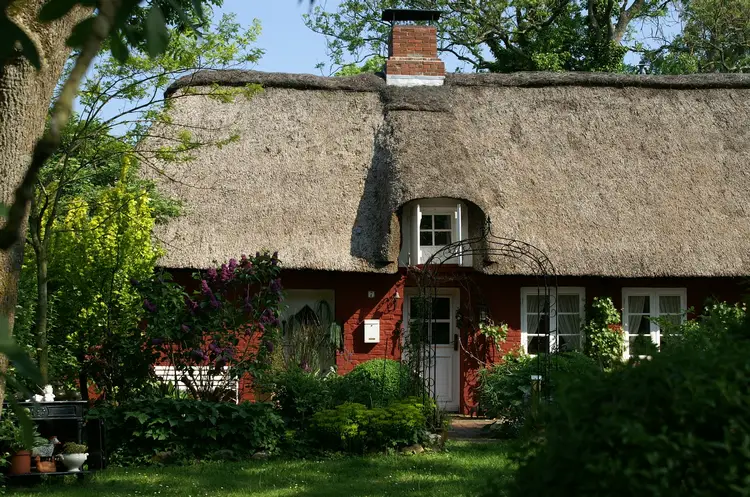
Final thoughts on should you buy a house with a thatched roof
Houses with thatched roofs look lovely and are the quintessential British cottage style. However, I have lived in houses with thatched roofs and I know I always got very nervous during thunder storms.
However, having said that I was living in a thatched cottage when it was struck by lightning, but it didn’t catch fire.
I’m sure what happened is the lighting strike was dispersed by the wire netting covering the thatch. This meant that the high voltage electricity from the lightning bolt transferred through the wire netting and earthed through the house.
Be aware that if the thatched property you are thinking about buying is a listed building, it will be more expensive to maintain. Also, listed buildings are more difficult to make changes to, which includes building extensions.
Before you buy a house with a thatch roof you should check when the thatch was last replaced. If this needs replacing in the next few years this will be expensive.
You should also consider the resale value. If the thatch needs replacing or maintenance when you come to sell, the work should be be done before you list with an estate agent.
Listed buildings, whether these are grade 1 or 2 listed, will put off some buyers. Also, not everyone likes to live in a thatched roof house, even if they like to look at them.
Buying as house with a thatched roof means you will have a house with great character. You’ll own a bit of history and you’ll be the next custodian of this old property. But it may also mean you’ve bought a house with more expensive insurance and costly ongoing maintenance. Not to mention a more expensive mortgage too.
I hope you’ve enjoyed this article about should you buy a house with a thatched roof
If you’ve enjoyed this article about “should you buy a house with a thatched roof” please share it on your favourite social media site.
Also, if you have any questions, please feel free to comment below too. Alternatively, if you need more help, please feel free to contact us on our contact us page here. Or join the discussion and ask your question in the property forum.


